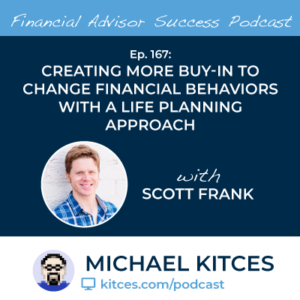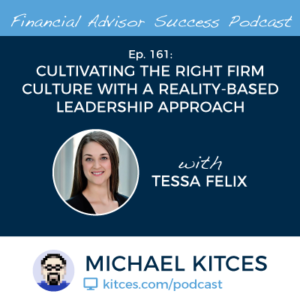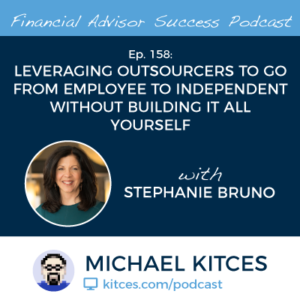Over the past decade the ongoing evolution of technology, from the rise of robo-advisor platforms to the broader reach of the internet and its ability for APIs to connect “everything”, has spawned both changes to advisor business models, (proposed) major shifts in regulation, and an entire wave of systemic changes to the financial planning landscape.
The end result of this overall industry evolution is a growing pressure on financial advisors to “step up” and add more value for clients, leading to the launch and growth of our own Nerd’s Eye View blog focused in Advancing Knowledge in Financial Planning, and over the years increasingly shared an ever-widening range of actionable insights with our community of financial advisors around broader industry trends (and what that means for both their clients and their careers).
Along the way, I’ve also become a ‘serial entrepreneur’, trying to leverage those industry insights to (proverbially) skate not to where the puck is but to where it’s going, and have co-founded and/or grown several business to not only take advantage of those emerging opportunities, but to (hopefully) help nudge the industry along, with an eye towards forever expanding our reach and impact to help more advisors and their clients by enabling real financial advisors to better hone their craft to become better and more successful.
Accordingly, I announced last week that, after 17 years, I was leaving from Pinnacle Advisory Group to go to Buckingham Wealth Partners, one of the few independent ‘mega-RIAs’ with nearly $50 billion of assets under management and advisement, that offers both wealth management services to consumers and a TAMP and other outsourced investment services for other RIAs. Which, in turn, has raised several questions around why I chose to change firms at this juncture, particularly to a “mega-RIA”, and what my move says about where I see the next batch of opportunities for our industry.
Specifically, I believe there are three broad trends that will determine the next stages in the evolution of financial planning the years ahead. First is that technology and so-called “Turnkey Advice And Planning Platforms” will allow “smaller” advisors to better compete with “large” firms by not only giving them the tools and capacity to provide the same level of service to their clients, but by facilitating new and more focused business models that larger firms can’t easily replicate (into increasingly focused niches and specializations), thus making financial advice available to more people than ever before. At the same time, the emergence of several firms with more that $10B under management suggests that the biggest firms will continue to get even bigger, through both organic growth and inorganic acquisitions, and reach national-scale, attracting a disproportionately large percentage of high-net-worth households, and shifting to a more ‘traditional’ business model where their advisors are employees (versus the legacy independent advisor percentage-of-revenue eat-what-you-kill model). Finally, as the industry moves farther away from being product-focused to advice-centric, advisor education, training, and experience will play an increasingly important role, as clients will demand increasingly complex and sophisticated advice, which advisors will have to be able to deliver if they want to differentiate themselves and defend their fees from amid a sea of advisors who all have the same value propositions.
Ultimately, the key point is that, as financial advice becomes more accessible to a wider audience, there is ample room for firms of all sizes, business models, and fee structures, because each can serve different segments of clients and be a good fit for different sorts of advisors, who each have their own personal/career goals and preferences. At the same time, technology will remain a constant influence, and will allow not only smaller advisors to thrive, but for “mega-RIAs” to achieve the sort of scale that was merely a pipedream just a decade ago… while at the same time pushing advisors to invest in their own expertise.
Of course, there are a number of mega-RIAs that I might have affiliated with, and for me, I chose Buckingham in particular because their emphasis on being technically proficient and willingness to develop a framework of “evidence-based” financial planning that aligns nicely with our own focus here on the Nerd’s Eye View, in addition to having a client-centric planning-centric culture, and a solid base of next generation leadership who are focused on how to do this sustainably for more and more clients over the decades to come. In other words, at some point decision of what firm to affiliate with isn’t just about a particular model or size, but choosing a firm with a clear vision and a concrete plan on how to be at the forefront of the next stages of financial advice.


 Welcome back to the 167th episode of Financial Advisor Success Podcast!
Welcome back to the 167th episode of Financial Advisor Success Podcast!


 Welcome back to the 161st episode of Financial Advisor Success Podcast!
Welcome back to the 161st episode of Financial Advisor Success Podcast!
 Welcome back to the 159th episode of Financial Advisor Success Podcast!
Welcome back to the 159th episode of Financial Advisor Success Podcast!

 Welcome back to the 158th episode of Financial Advisor Success Podcast!
Welcome back to the 158th episode of Financial Advisor Success Podcast!

 Welcome back to the 156th episode of Financial Advisor Success Podcast!
Welcome back to the 156th episode of Financial Advisor Success Podcast!
